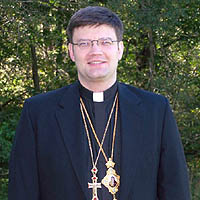 Bishop Paul Peter Jesep
Bishop Paul Peter Jesep
Russia will not leave Ukraine alone
— By Bishop Paul Peter Jesep
 Bishop Paul Peter Jesep
Bishop Paul Peter Jesep
|
It is extraordinarily naive to think that Russia will walk away from Ukraine even if, as expected, Viktor Yushchenko becomes the next president. Moscow is not yet capable of accepting a sovereign Ukrainian nation because there is too much at stake for it historically, politically and economically. This attitude will not change in our life time or even over the next several generations.
There remains among many Russian politicians, bureaucrats, church leaders and the ordinary citizenry a commitment to pan-Slavism. Many still believe in a nation composed of the three great Eastern Slav peoples - Ukrainians, Byelorussians and Russians. Of course there is an underlying expectation that governance would come primarily from Moscow. Byelorussia has already turned away from democracy to walk into the Russian shadow.
Anne Applebaum writing for the Washington Post was surprised after learning how a Western educated college freshman from Russia felt about events in Ukraine.
The Post reporter initially thought that the young woman meant "that she and her family were upset because the Russian government had helped the Ukrainian government try to steal the election. But in fact, they were upset because they thought Ukraine might leave Russia's sphere of influence.” Applebaum quoted the Russian student saying, "If all of these countries around us join NATO and the European Union, Russia will be isolated. We must prevent that from happening." Although this shows a total disregard for the will of a sovereign nation, more important it underscores the historic Russian attitude toward Ukraine.
"These were casual comments," the reporter reflected, "and they came from someone who was in no way a typical Russian. But that was precisely the oddness of it: A young woman, educated in the West, felt affronted because Russia's neighbors want to join Western institutions. And compared with the views of some others, who are not educated in the West, hers are relatively mild.”
|
“Why am I nailed upon the cross? – Taras Shevchenko |
The Guardian of London quoted Russian President Vladimir Putin saying in the midst of the worldwide outrage over recent election fraud that "If Ukraine wants to enter the European Union and is welcomed there, then we can only be pleased.'' Prior to the comment he had consistently expressed irritation toward any movement by Ukraine toward Western organizations. He even had the hubris to lecture democracies not to “meddle” with Ukraine's internal affairs. After all, that was his job.
Putin is merely waiting for things to cool down. The Russian president realizes how badly he stumbled in attempting to overtly manipulate Ukraine last time. He will not make the same mistake twice. Now he's deceptively disinterested in the election's outcome.
What Putin has failed to achieve with raw, political bullying he will accomplish with other tactics. Trade agreements between Kyiv and Moscow could be used as leverage to contain an emerging Ukrainian consciousness. Inciting ethnic unrest in the Crimea or Eastern Ukraine could be another. This needs to be carefully monitored in the post-Kuchma era by Western governments and Diaspora Ukrainians.
There are an estimated 7,000 election observers for the December 26th presidential rematch. That's great. The odds are better than fifty percent that presidential candidate Viktor Yushchenko will rightfully win. Liberty has a chance.
The opponents of Ukrainian sovereignty appear accommodating at present. It's all the more reason to be on guard for the long-term. Putin is still looking and will continue searching for ways that provide Russia an advantage in Europe's second largest nation.
There are many trade and professional groups throughout the world linked to their Ukrainian heritage that must stay involved. The Ukrainian-American Bar Association, for example, is one of them though there are counterparts in other countries. These groups comprise lawyers, doctors, professors, and teachers that will have much work to do after the December 26th election.
Lawyers can further help buttress the fledgling judicial system, professors can encourage more student exchanges with thriving democracies, writers can better assist journalists create and sustain a free media and church leaders must be open minded about religious freedom while reminding the Russian Orthodox Church and its allies that they do not have the legal or moral authority to tell Ukrainians how to walk with God.
The former KGB agent has time on his side. Perhaps he'll wait for Yushchenko to fall ill. Or as noted twist an economic noose around Ukraine's neck. Putin will never give up. To do so runs contrary to centuries of Russian imperial history. Although Diaspora Ukrainians expect to celebrate Yushchenko's victory; they must be even more engaged if the marvelous achievements of the Orange patriots are to be protected from the northern neighbor.
Bishop Paul Peter Jesep is the Vicar General and Chancellor of the Archeparchy for the Ukrainian Autocephalous Orthodox Church of North and South America Sobornopravna. His Grace, a lawyer and political scientist by training, is a former legislative analyst to U.S. Senator Susan Collins (R-ME). He has studied at Bangor Theological Seminary (bts.org), the third oldest such school in the United States. His Grace may be reached at VladykaPaulPeter(a)aol.com. The views expressed here are strictly personal.